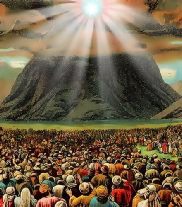A Journey through the Bible with Tiglath
15. Exodus Chapter 16 to Chapter 19 verse 16.
Chapter 16 finds the Israelites complaining to Moses that they had plenty of
food in Egypt, but that he had brought them into the desert to starve them to
death. Read the whole of the chapter to discover how God fed the Israelites
for the next forty years. Note hat the food kept fresh for one day only, except
on the sixth and seventh days. The fact that Manna did not keep, and that God
renewed it every day, demonstrated how much the Israelites depended on
God. At the end of Chapter 16 Moses is instructed by God to keep a jar of
Manna (which kept fresh) for future generations to see what the Israelites
lived on in the desert. An 'omer' is a bowl which holds about two litres.
In Chapter 17 it is the lack of drinking water that
is the problem. Tempers rise and Moses is fearful
of being stoned, so, once again, he turns to God
for advice. God never fails him, and he is instructed
to take some of the elders with him and go and
find a certain rock in Horeb. When found, he had
to strike it with the rod with which he had once
struck the Nile. When he did this, water gushed
out of the lime-stone which often does contain
water. Moses named the place Massah and Meribah.
It is tempting to think that the Israelites were now in a wilderness devoid of other
people. This was not the case and it is certain that the influx of all these slaves was
not welcome. In Chapter 17 verse 8 the Amelekites attacked the Israelites. Read
the following verses to see how much encouragement Joshua, the Israelite
general, received from Moses standing on a hill. Joshua will figure later in our
journey when we enter the Promised Land.
You will recall that when Moses left Egypt in a hurry, after killing an Egyptian,
he was sheltered by Jethro whose daughter Zipporah he married. She gave him
two sons, Gershom and Eliezer. In Chapter 18 verse 5 Jethro, Zipporah and her
two sons come out into the wilderness to visit Moses. In verses 13 to 23 Jethro
gives Moses some very good advice. He tells Moses not to try to do everything
himself, but to set up an organisation of capable men able to decide simple
legal cases leaving Moses to deal with the more difficult ones. Here we begin to
see the first signs of the founding of a nation as a rabble of slaves are given legal
decisions from which laws can be constructed. The real key to this change
of status begins in Chapter 19 when the Israelites encamped opposite Mount Sinai.
Here Moses, in verse 5, goes to the mountain and is told by God that, having been
brought out of Egypt, if only the Israelites will keep his covenant they will be His
special possession. Verse 6 states, ‘You shall be
my kingdom of priests, my holy nation’.
So we have the beginning of a theocracy. It is
very important to read verse 7 onwards in
Chapter 19 because in one of the
most solemn and rare occasions on our
journey through the whole Bible the Israelites
are taken by Moses to the foot of Mount Sinai
to meet God.
Note that God appeared in a black cloud; also note the preparations the people
had to make to meet God. Firstly, they had to wash their clothes; they and their
beasts were not allowed to touch the mountain on pain of death. The men
were not allowed to go near a woman. Only when a ram's horn sounded could
they go to the mountain. On the third day there were peals of thunder, flashes
of lightning and a loud trumpet blast. Verse 16 tells us that the people were
terrified at this manifestation of the mighty power of God.
Next month we discover what happens when Moses and Aaron are invited by
God to meet Him on Mount Sinai.
Manna rained down from heaven
